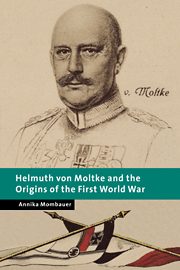Book contents
- Frontmatter
- Dedication
- Contents
- List of illustrations
- List of maps
- Acknowledgements
- Hierarchy of ranks for officers in the German army before 1914
- List of abbreviations
- General map of Europe
- Introduction
- 1 Military decision-making in Wilhelmine Germany
- 2 Alfred von Schlieffen and Helmuth von Moltke: ‘military genius’ and ‘reluctant military leader’?
- 3 From crisis to crisis: the international background to military planning in the pre-war years
- 4 The July Crisis and the outbreak of war: the German perspective
- 5 The General Staff at war
- Conclusion. Myths and Realities: Helmuth von Moltke and the origins of the First World War
- Bibliography
- Index
3 - From crisis to crisis: the international background to military planning in the pre-war years
Published online by Cambridge University Press: 05 June 2016
- Frontmatter
- Dedication
- Contents
- List of illustrations
- List of maps
- Acknowledgements
- Hierarchy of ranks for officers in the German army before 1914
- List of abbreviations
- General map of Europe
- Introduction
- 1 Military decision-making in Wilhelmine Germany
- 2 Alfred von Schlieffen and Helmuth von Moltke: ‘military genius’ and ‘reluctant military leader’?
- 3 From crisis to crisis: the international background to military planning in the pre-war years
- 4 The July Crisis and the outbreak of war: the German perspective
- 5 The General Staff at war
- Conclusion. Myths and Realities: Helmuth von Moltke and the origins of the First World War
- Bibliography
- Index
Summary
The years 1908 to 1914 confronted German decision-makers, both military and political, with a succession of crises, culminating in the events of July 1914 and the resulting war. Every major pre-war crisis threatened to escalate into armed conflict, and when war was averted on many occasions before 1914, not everyone approved. During these years, Moltke became convinced that war was unavoidable, even that it was a necessity for Germany, and he continually advocated it.
However, Moltke's hands were tied as long as a number of necessary preconditions for war were lacking. These were, first of all, the much-needed army increases. The Chief of the General Staff knew that Germany's deployment plan required huge numbers of troops. His aim was a numerical superiority to, or at least parity with, the enemies in the West and East. However, before 1911, the General Staff did not exert any real pressure to push for army increases. Only after the humiliation at Agadir did the General Staff manage to gain support for its demands. The ‘dual militarism’ of the time is only one explanation of why Moltke remained passive on the important issue of army increases until 1912. The General Staff and the Ministry of War differed in their opinions about the kind of increases Germany's army required: while the General Staff wanted numerical increases on the highest scale possible, the Ministry of War was more concerned with the quality than the quantity of available soldiers. Other restraints were financial: there was simply not enough money to fund the huge naval increases of Tirpitz's programme as well as General Staff demands. It has also been suggested that Germany felt reasonably secure on the continent until about 1912, and that there was a general confidence within the army that Germany was still superior to her prospective opponents.
- Type
- Chapter
- Information
- Helmuth von Moltke and the Origins of the First World War , pp. 106 - 181Publisher: Cambridge University PressPrint publication year: 2001



